We caught up with the brilliant and insightful Dan Rossi a few weeks ago and have shared our conversation below.
Alright, Dan thanks for taking the time to share your stories and insights with us today. Let’s talk legacy – what sort of legacy do you hope to build?
I would like to be remembered as a man who believes in doing the right thing for others. Losing my livelihood only strengthened my commitment and resolve to protect those who can’t protect themselves. I hope to be remembered as a former Marine who stayed true to his character and died with his boots on.
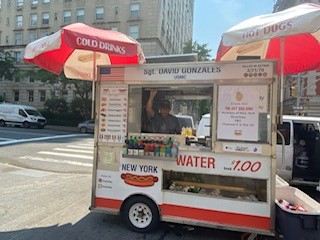
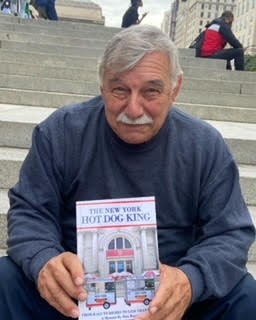
Dan , before we move on to more of these sorts of questions, can you take some time to bring our readers up to speed on you and what you do?
I was seventeen when I joined the U.S. Marines. After serving two tours in Vietnam, I signed up for a third tour but was injured in a vehicle accident and was honorably discharged. After returning home I entered into the trades as a sheet metal worker. One day, a fellow I knew asked me to build him a hot dog cart. He had suffered a heart attack and was planning to retire and sell hot dogs in front of his favorite bar. I was working full-time during the day so I had to build the cart at night. The only place I could it was in my backyard. It took a few weeks during which time, the fellow changed his mind about retiring. I was stuck with the cart. But not for long. I placed an ad in the local paper and quickly sold it. I built another, and then another. I had tapped into a new marker. It was the turning point that led me in a new direction. I entered into an informal partnership with the company that built the wheels and we hired veterans through a VA program. The business was doing well until the veterans wanted to join a union. My partner fired them; I defended them in court and my partner retaliated by locking me out of the shop. I found a small space to house my equipment and continued building carts. But there were no customers. Those first few months were brutal. I had to come up with something clever to make it work. Meanwhile, I loaded trucks at night and one day the light bulb went on. I had an idea. I built a miniature hot dog cart for catering halls. packed it into the back of my station wagon and went from one catering hall to the other, covering all the boroughs of Manhattan and into New Jersey. It worked. The miniature carts saved my business. By that time, the veterans who I defended in court had won and were rehired. The irony is that my former partner started buying full-sized carts from me. With a lot of hard work and sweat my business started growing. In New York City, a food cart is useless without a permit. I knew how to build carts but very little about the vending industry. I got lucky and found a way to finance the purchase of two companies that included 499 food permits. Within ten years, I built the largest vending company in the history of New York City from the bottom up in a very competitive environment. I had gained respect within the industry as a man of fairness and integrity who made high-quality products at reasonable prices. The city sought my expertise in developing guidelines and standards for all types of vending equipment. But there was more to being successful. Growing up poor, I was finally in a position to give back, helping thousands of immigrants coming into this country support their families through vending. And being proud of my military service, I had a special obligation to those who served our country. Any veteran who walked into my shop was offered a free food cart and the chance to become an independent food vendor. I had reached the pinnacle of success. That is until Donald Trump entered my life. It’s a long story how detailed in my memoir, “The New York Hot Dog King” but in short, he had convinced the State Legislature to revoke the vending rights of disabled veterans. I wasn’t naive, but I believed that what was happening to the vets was wrong. Once I got into the fight on their behalf, I landed smack into the middle of the gritty world of politics, lies, corruption, and destruction. Once I became the mouthpiece, I became the target. I dug in and that’s when I found myself standing alone. In the end, it was a victory for the vets, but it destroyed my livelihood and took a tremendous toll on my family. A new law was passed preventing anyone from owning more than one food cart permit. It was referred to as “the Dan Rossi law” because the city found ways to get around it for other companies, but not for me. I was left with one food cart permit in my company name. As the saying goes, “No good deed goes unpunished.” After a few painful years of struggling to keep my company from failing while fighting in court, I had to face reality. I lost my business, my livelihood, and my home. The only valuable asset left was one food cart permit in my company name. I had to find a way to reinvent myself to support my family. I sucked in my pride and took my only valuable asset-my food cart permit. I borrowed a small hot dog cart. It was the start of a new chapter in my life as a hot dog vendor. That one remaining permit gave me a new lease on life. I had to make it work and set out to find a location..
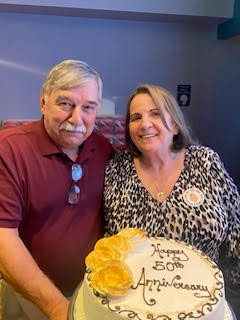
Where do you think you get most of your clients from?
Without question social media. The attention I received from media outlets such as Munchies on Vice media, which led to a commercial for Ally Bank. Humans of New York led to a number of news paper and radio interviews. Top that off with Netflix and I’m known in just about every country. And people come to meet me and taste the best hot dog in New York City.
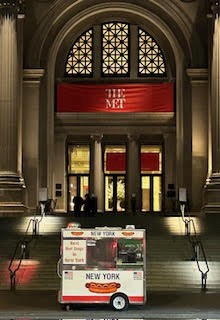
We’d love to hear a story of resilience from your journey.
I found a perfect spot in front of the Metropolitan Museum of Art, As soon as I put my little hot dog cart there, I knew there would be trouble. The concessions that paid a lot of money to put their carts freaked out. My little hot dog cart was making money and they couldn’t compete with my prices. The Met was beside itself and wanted me out. The city came after me this time not for speaking out on behalf of the vets, but for being one. I dug in and held my ground. I was harassed daily and even arrested but there was nothing anyone could do. I was following the law. And I was providing for my family. My circumstances had changed but I was the same person. Becoming a hot dog vendor — as simple as it may seem — threw me right back into the lion’s den. Locating my hot dog cart in front of the Metropolitan Museum of Art started a different battle. Like before, I refused to give in and I would not give up. I had become fairly well-known locally and used my platform to advocate on behalf of veterans. The city tried to remove me, but they couldn’t take my right to vend away, and it took several court battles to keep it. But not just for me. My voice has forced the city to give food permits to every disabled veteran who asks. Some might think that losing a vending empire to defend disabled veterans was foolish, I say they haven’t walked in my shoes carrying wounded and dead Marines and others off a battlefield. Not defending the veterans would dishonor those who gave all. I could never let that happen. I’ve gained a lot of publicity and even wrote my memoir, “The New York Hot Dog King, From Rags to Riches to Less Than Rags: available on Amazon. Some say I’m the quintessential New Yorker; some call me an “icon.” I don’t pay much attention to all that. I’m just doing my job. Meanwhile, people from all walks of life stop by to say “hello” and taste “The Best Hot Dogs in New York.” Who knows where it will all end but what I do know is that I’ll never stop fighting for my rights and the rights of all veterans. I plan to end my career with my boots on as I retire one day to Alaska to pan for gold.
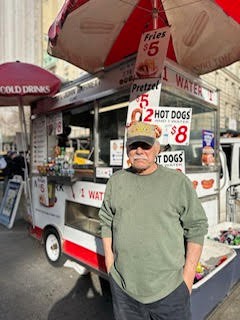
Contact Info:
- Website: Newyorkhotdogsnyc.com
- Instagram: nyhotdogs
- Facebook: TheHotDogKing
- Youtube: Munchies one of NYC last independent hot dog vendors
- Other: Netflix episode 3 Street Food USA NY NY. Tic Tok ny hotdogs. Amazon books A Memoir by Dan Rossi, “The New York Hot Dog King From Rags to Riches to Less Than Rags”


